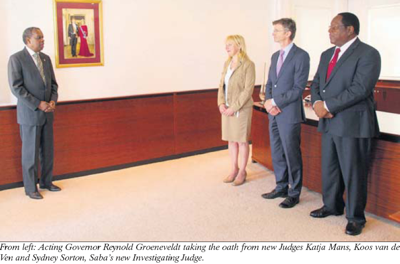The Daily Herald reports how the Judges Koos van de Ven and Katja Mans were officially installed as Judges at the Court of First Instance during an extraordinary sitting of the Joint Court of Justice on Friday afternoon. Earlier that day, the two new Judges were sworn in by Acting Governor Reynold Groeneveldt, during a private ceremony. New Joint Court President Evert Jan van der Poel welcomed the new Court officials in the presence of Governor Eugene Holiday, Prime Minister Sarah Wescot-Williams and a large number of attorneys. This was not his first sitting as a Judge in St. Maarten, Van der Poel said, who first came here as a young judge at the age of 27. Back in 1986, the Post Office was still located on the ground floor of the courthouse, he reminisced. He said he felt like coming home, and thanked the governments of The Netherlands, Aruba, Curaçao and St. Maarten for their trust in him. The Court President said he would dedicate himself to guaranteeing “independent, incorruptible and professional administration of justice on St. Maarten,” with the support of his colleague-judges.
Van der Poel briefly introduced the two new Judges, who both worked previously at the Court of Amsterdam. Van de Ven was a Judge at this Court since 2002, dealing with immigration law, criminal and administrative law. The Court President said that his colleagues characterized Van de Ven as “an excellent lawyer, profound, creative and tenacious,” but also as “someone who is looking for solutions,” and who is pragmatic. He wished Van de Ven and his wife Janine a heartfelt welcome to St. Maarten. Katja Mans worked in the administrative and civil law sections of the Amsterdam Court since 2004. On St. Maarten, she will handle administrative cases, as well as civil injunctions and labour cases. Mans is also available to train apprentice registrars, Van de Poel said, who wished her and her son Micha much success.
Farewells
The Joint Court also bade farewell to two senior officials. Former President and member of the Joint Court Lisbeth Hoefdraad resigned from the Court after almost 20 years of service. Her successor said Hoefdraad had laid a solid foundation under the Joint Court, which had become an independent organisation with its own responsibility for personnel and financing, since 10/10/10. This has cost Hoefdraad “a lot of thinking, time and energy,” Van der Poel said. Wally Havertong, who has been Prosecutor, Acting Judge since 1996, as well as Investigating Judge in criminal cases, was also thanked for his long years of service. He went on official retirement on July 1. Acting Solicitor General Taco Stein commended the new judges for taking the step to leave the biggest Court of the Kingdom for the second smallest. Stein pointed at the fact that both will have to adjust themselves to the Caribbean way of life. Stein also seized the opportunity to introduce two relatively new Prosecutors: Tineke Kamps who came into service October 1, 2012, and Karola van Nie, who started working at the Prosecutor’s Office on January 1, 2013. Kamps was a Prosecutor in The Hague, where she dealt with heavy crimes, such as human trafficking and drugs. Kamps became fascinated with law via the abduction of beer magnate Freddy Heineken. One of the abductors, Willem Holleeder, was arrested in French St. Martin. Van Nie worked at the Council of State, Refugee Foundation Vluchtelingenwerk and the Court in Den Bosch, after which she made the switch to the Prosecutor’s Offi ce, lastly as Youth Prosecutor in Utrecht. The Solicitor-General also paid some attention to the criticism and negative publicity about St. Maarten in The Netherlands. Stein said that Country St. Maarten is still very much a “baby,” and can hardly be compared with “old man” The Netherlands, which will be celebrating 200 years of the Kingdom in 2014. Stein said St. Maarten should be granted time to build the country, adding that “integrity, transparency and accountability” are among the fi rst items to be addressed.
Dream come true
Also on behalf of her colleague Van de Ven, Mans said it was a dream come true to be able to work on a beautiful, tropical island for a couple of years. She said she had faced her integration on the “friendly island” head-on. She had tasted her first gennip fruits and Johnny cakes, had called in pest control, purchased her child’s school-uniform and started buying newspapers on the street. She also bought her firstever machete, “to curb the growth of banana trees in my garden,” she added reassuringly. She also had a first-hand experience of islanders’ friendliness after her “new” old four-wheel drive car had broken down. The gathering was closed with a reception in the garden of the former building of the Parliament of the Netherlands Antilles, which will soon provide much-needed additional office space to Courthouse staff.

 Archive of posts from Saba-News.com Archive Saba News
Archive of posts from Saba-News.com Archive Saba News